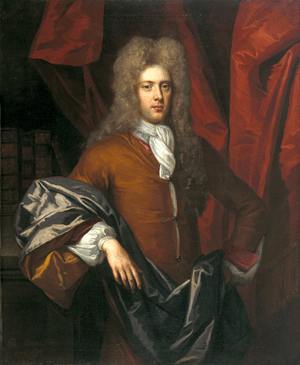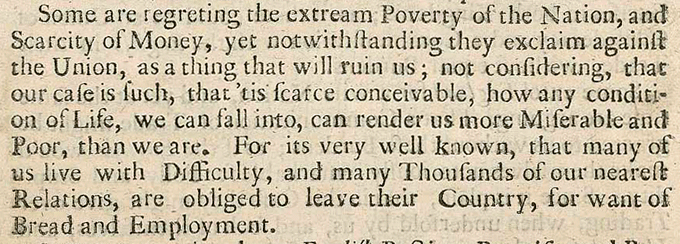| | Home | Resources | Schools Programme | Teachers | Site help | About us | Contact us | |
| You are here: Home > Resources >The Union of 1707 > Opinions in favour of Union |
|
||||
Peace and security
James Ogilvy, Earl of Seafield and a member of the Court Party, was one of the Scottish commissioners. He wrote to the Earl of Godolphin, the Queen’s senior minister and Lord Treasurer of England, with clear reasons why he supported union. Edinburgh, 1 August 1705 (Letters relating to Scotland in the reign of Queen Anne by James Ogilvy, First Earl of Seafield, and others, 1702-1707, Second Series, Scottish History Society, Vol XI p.63) The image on the left shows James Ogilvy, 1st Earl of Seafield, by Sir John Baptiste de Medina, from the Scottish National Portrait Gallery Collection. |
||||
A Question of IdentityThe Earl of Cromartie was enthusiastic about becoming British. In January 1706, he wrote to the Earl of Mar, the Scottish Secretary of State, to wish him well for the talks. God give all of you prudence, wisdome & honesty & Brittish minds. May we be Brittains; & down goe the old ignominious names of Scotland; of England… Brittains is our true our Honourable denomination. (National Records of Scotland, Mar and Kellie papers, GD124/15/279/1) |
||||
A boost to the economy?Another commissioner, Sir John Clerk of Penicuik, believed union was the only way forward to make Scotland a more prosperous country. Some are regreting the extream Poverty of the Nation, and Scarcity of Money, yet notwithstanding they exclaim against the Union as a thing that will ruin us; not considering that our case is such, that ‘tis scarce conceivable, how any condition of Life we can fall into, can render us more Miserable and Poor, than we are. For its very well known that many of us live with Difficulty, and many Thousands of our nearest Relations are obliged to leave their Country, for want of Bread and Employment.  (National Records of Scotland, Clerk of Penicuik papers, GD18/3129, extract from A Letter to a Friend Giving an Account of how the Treaty of Union has been Received, 1706, p.6 © Sir Robert Clerk of Penicuik) | ||||
| ||||
Winning the argument in favour of UnionIn October 1706, David Boyle, the Earl of Glasgow, informed the Earl of Godolphin that more groups of society in Scotland were beginning to change their opinion in favour of union. …My Lord, I am heartily glad that I can give your Lordship good hopes of the success of the treaty. Our clergy are become verry calm, and many of our members of Parliament upon second thoughts have altered their opinion, and are now friendly and hearty for the union. Letters relating to Scotland in the reign of Queen Anne by James Ogilvy, First Earl of Seafield, and others, 1702 – 1707, Second Series, Scottish History Society, Vol XI. p.183 | ||||
|
|